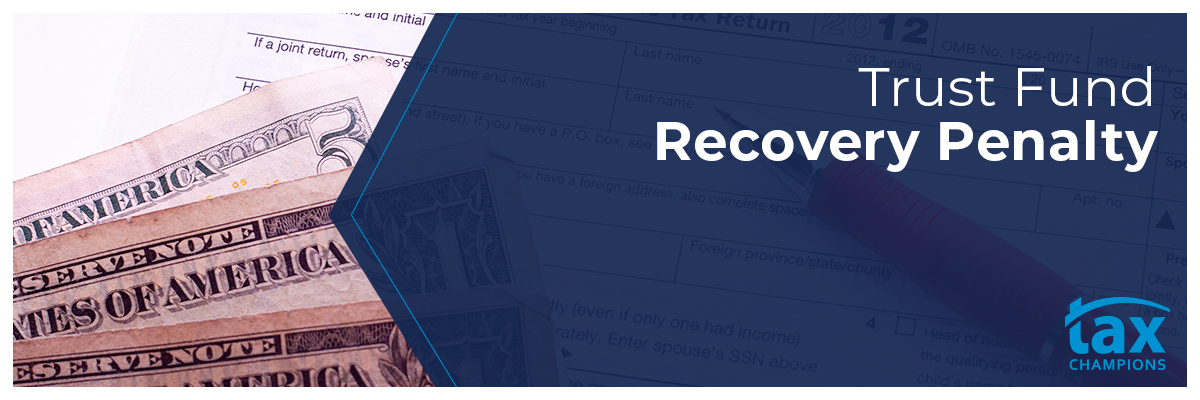Trust Fund Recovery Penalty

What is the Trust Fund Recovery Penalty? Businesses must collect and hold employees’ federal income, Social Security and Medicare taxes, according to the tax code. The IRS also refers to these as employment taxes. Once the business collects them, they hold them in a trust fund until they make their payment to the IRS.
If the business doesn’t send these payments by the deadline, the IRS assesses a penalty. The intention is to recover the funds from the responsible parties. It’s called the Trust Fund Recovery Penalty or TFRP.
While most penalties are monetary or involve jail time, the IRS characterizes this penalty as a collection action.
A revenue agent examines the business’s standard practices in financial affairs to determine which individuals are responsible for paying the taxes. These individuals are personally liable for their share of the unpaid taxes. This is the Trust Fund Recovery Penalty. A monetary penalty in the amount of 100 percent of the unpaid taxes is also part of the TFRP.
Who is Responsible for the Trust Fund Recovery Penalty?
The revenue agent must establish two things to show that the Trust Fund Recovery Penalty is appropriate for an individual. Firstly, the revenue agent must find that the individual was responsible for making the business’s tax payments. Secondly, he or she must find that the individual “willfully” neglected to do so.
According to the IRS, responsible parties are commonly a company board member, company partner, or employee with the authority or duty to manage the company’s financial tasks.
The CPA Journal notes, “IRC section 6672 requires significant control over the business’ financial authority is circumscribed by, for example, a senior officer who has the final say on which creditors will be paid, Trust Fund Recovery Penalty liability will not apply.”
The IRS takes a common-sense approach to discovering who’s liable for the TFRP. To determine who should be assessed with the TFRP, they examine vendor contracts, cancelled checks and other documented evidence. Generally, these specifically reveal which individuals are involved in the company’s financial transactions.
That’s not to say that any individual the IRS deems a responsible party is vulnerable to the TFRP. In fact, identifying individuals who are financially responsible for the business is only half of the investigation. The IRS must also find that their actions were intentional or negligent.
The IRS defines intentional actions as done “voluntarily, consciously, and intentionally” to use the collected monies for other purposes. They further note, “You are acting willfully if you pay other expenses of the business instead of withholding taxes.”
In other words, individuals aren’t commonly liable for the TFRP if they didn’t know about the missed tax payments. An individual who’s unable to override another person’s financial authority in the business aren’t liable for the TFRP liability either.
CONTACT OUR TAX RELIEF EXPERTS TODAY!
Tax Relief Services
Form 4180: Report of Interview with Individual Relative to Trust Fund Recovery Penalty or Personal Liability for Excise Taxes
If the IRS has you in their sights for the Trust Fund Recovery Penalty, then a revenue agent will seek a face-to-face meeting. The agent does this in the hope that he'll achieve a spoken or written interview. The IRS then uses your statements in the case against you throughout the process. So, be careful.
You may complete this interview on Form 4180: Report of Interview with Individual Relative to Trust Fund Recovery Penalty or Personal Liability for Excise Taxes.
Responses to the written interview should be thorough and concise. Above all, avoid revealing information that may lead the agent to believe that you’re responsible for the unpaid employment taxes.
Later, after the interview form is signed, the agent will send notices to the parties that they’ve deemed responsible for the unpaid employment taxes. Therefore, you’ll receive a notice if you were found responsible in full or in part. It’ll explain the assessment and include a due date, as well as payment instructions.
If you’re partly responsible for the penalty, the IRS will demand just your part of the unpaid taxes and penalty. Likewise, if you’re wholly responsible, your demand for payment includes all the unpaid taxes and the 100 percent penalty.
Individuals certainly have the legal right to file an appeal by responding to the notice within 60 days. The individual along with his or her representative may submit the appeal, including a written response and supporting documentation.
Who can help me in my assessment for TFRP liability?
Every taxpayer has the right to have professional representation during the TFRP assessment interview. As a matter of fact, the written or in-person interview should be preceded with extensive preparation by the individual and his or her tax adviser.
Three types of tax professionals have unlimited representation rights with the IRS. These are certified public accountants, enrolled agents, and tax attorneys.
Tax attorneys have a unique skill set that serve taxpayers best in a court of law. A tax attorney makes sense for a defendant in tax court against an accusation of fraud, for example.
On the other hand, an enrolled agent focuses their duties primarily on tax matters. His or her perspective is one-dimensional. An enrolled agent is an appropriate choice for representation during a TFRP assessment.
Finally, certified public accounts have unlimited representation rights with the IRS. Many taxpayers choose to hire accountants with a specialty in tax relief for representation during a TFRP assessment. This tax adviser works in most areas of finance with a focus in tax. Therefore, he or she has a well-rounded perspective with a unique opportunity to maximize the defense of your case.
Regardless of which kind of representative you hire, verify credentials and reputation. In other words, if the tax adviser is an accountant, make sure his certification is current with the Board of Accountancy. Be sure to check in with the IRS about your enrolled agent’s standing.
In addition, confirm a quality reputation by looking at the tax professional’s Better Business Bureau profile. Also, be sure to verify that there are no complaints with their governing entity.
A Final Trust Fund Recovery Recourse
Responsible parties can avoid the liability of a company’s employment taxes by having an extensive understanding of the business practices. This should include everyone’s role in disbursing money to creditors, as well. Cases with rich documented support have the best chance at a favorable outcome. This documentation can also include written testimony from third parties.
A professional tax adviser should present your case with verifiable facts and a comprehensive understanding of the TFRP.
If you receive a notice that says the IRS is assessing you with a Trust Fund Recovery Penalty, hire professional help immediately. Consider the tax professional’s experience and success rate for the best possible outcome. Gather comprehensive documents that support your case. Be sure to include contact information for parties who may be called upon to submit affidavits, as well.
Why Tax Champions?
At Tax Champions, we’ve been representing taxpayers in TFRP cases for 35 years. Our extensive experience and credentialed staff are committed to the thorough preparation of your case and our skilled advocacy for your best interests are second to none.
Give us a call morning, noon or night for a free, no-obligation consultation and we’ll discuss options for your specific circumstances, as well as how to take the next step.
You can reach us at 800.518.8964 or enter your contact information in the blue box on the right side of this page and a knowledgeable staff member will reach out to you. Sleep better tonight knowing that your case is in the capable hands of an extensively experienced and effective tax relief professional. Call now.
Sources
[1] (2019, September 10). 5.7.4 Investigation and Recommendation of the TFRP: Internal Revenue Service. Retrieved from //www.irs.gov/irm/part5/irm_05-007-004r
[2] (2019, June 26). Employment Taxes and the Trust Fund Recovery Penalty TFRP: Internal Revenue Service. Retrieved from //www.irs.gov/businesses/small-businesses-self-employed/employment-taxes-and-the-trust-fund-recovery-penalty-tfrp
[3] (2017, November 27). The Trust Fund Recovery Penalty. Retrieved from //www.cpajournal.com/2017/11/28/trust-fund-recovery-penalty/
[4] (2019, May 7). Understanding Tax Return Preparer Credentials and Qualifications. Retrieved from //www.irs.gov/tax-professionals/understanding-tax-return-preparer-credentials-and-qualifications
